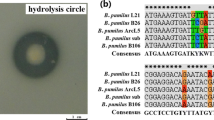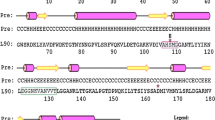Abstract
Lipases with high tolerance to temperature play a significant role in industry from food manufacturing to waste management systems. Thus, there is a need to investigate these enzymes from different geographical areas to look out for a more thermo-stable one. Characterization of lipases through experimental approaches is time consuming process and sometimes the results are ambiguous due to errors. However, integration of computational technologies is quite useful for prediction of optimized conditions. Such technologies can be applied as synthetic biology, which has many major applications in engineered biological approaches for accurate prediction of effects of different physical and chemical parameters on the system. In this study, cloning and expression of a lipase gene from Bacillus amyloliquefaciens, isolated from a novel geographical region of Pakistan, in Escherichia coli DH5α cells followed by sequencing was carried out. To isolate thermostable lipase producing strains, all the samples were kept at 50 °C. Genomic DNA was isolated and signal peptide (1–32 residues) sequence was chopped (ΔSPLipase). The ΔSPLipase was amplified and expressed in Linearized p15TV-L vector. The purified lipase appeared as single band of approximately 26 kDa. Suitable conditions of factors required for maximum lipase activity such as temperature, pH, substrate, organic solvent, detergents and metal ions were predicted through synthetic biology approach and further confirmed in wet lab. The predicted suitable factors for enzyme were almost similar to those determined experimentally. The optimum enzyme activity was recorded at pH 8 and 50 °C temperature. Interestingly, the activity of enzyme was found on a number of solvents, metal ions, detergents, and surfactants. The predicted optimum values and their experimental confirmations highlights the importance of integrated synthetic biology approaches in wet lab experiments. The characterized lipase of B. amyloliquefaciens at molecular level from Pakistani strains displayed good activity on a range of factors that implies this strain to be used for application in industrial level production.



Similar content being viewed by others
References
Alquéres SMC, Branco RV, Freire DMG et al (2011) Characterization of the recombinant thermostable lipase (Pf2001) from Pyrococcus furiosus: effects of thioredoxin fusion Tag and Triton X-100. Enzyme Res 2011:316939. https://doi.org/10.4061/2011/316939
Ananthi S, Ramasubburayan R, Palavesam A, Immanuel G (2014) Optimization and purification of lipase through solid state sermentation by Bacillus cereus Msu as isolated from the gut of a marine fish Sardinella longiceps. Int J Pharm Pharm Sci 6:291–298
Canton B, Labno A, Endy D (2008) Refinement and standardization of synthetic biological parts and devices. Nat Biotechnol 26:787–793. https://doi.org/10.1038/nbt1413
Freedman B, Butterfield RO, Pryde EH (1986) Transesterification kinetics of soybean oil 1. J Am Oil Chem Soc 63:1375–1380. https://doi.org/10.1007/BF02679606
Gumulya Y, Reetz MT (2011) Enhancing the thermal robustness of an enzyme by directed evolution: least favorable starting points and inferior mutants can map superior evolutionary pathways. ChemBioChem 12:2502–2510. https://doi.org/10.1002/cbic.201100412
Hasan F, Shah AA, Hameed A (2006) Industrial applications of microbial lipases. Enzyme Microb Technol 39:235–251. https://doi.org/10.1016/j.enzmictec.2005.10.016
Javed S, Azeem F, Hussain S et al (2018) Bacterial lipases: a review on purification and characterization. Prog Biophys Mol Biol 132:23–34. https://doi.org/10.1016/j.pbiomolbio.2017.07.014
Jung S, Park S (2017) Dual-surface functionalization of metal-organic frameworks for enhancing the catalytic activity of Candida antarctica lipase B in polar organic media. ACS Catal 7:438–442. https://doi.org/10.1021/acscatal.6b03222
Kanmani P, Kumaresan K, Aravind J (2015) Gene cloning, expression, and characterization of the Bacillus amyloliquefaciens PS35 lipase. Braz J Microbiol 46:1235–1243. https://doi.org/10.1590/S1517-838246420141068
Kaushik AC, Sahi S (2015) Boolean network model for GPR142 against Type 2 diabetes and relative dynamic change ratio analysis using systems and biological circuits approach. Syst Synth Biol 9:45–54. https://doi.org/10.1007/s11693-015-9163-0
Kobayashi H, Kærn M, Araki M et al (2004) Programmable cells: interfacing natural and engineered gene networks. Proc Natl Acad Sci USA 101:8414–8419. https://doi.org/10.1073/pnas.0402940101
Lajis AFB (2018) Realm of thermoalkaline lipases in bioprocess commodities. J Lipids 2018:5659683. https://doi.org/10.1155/2018/5659683
Leow TC, Rahman RNZRA, Basri M, Salleh AB (2007) A thermoalkaliphilic lipase of Geobacillus sp. T1. Extremophiles 11:527–535. https://doi.org/10.1007/s00792-007-0069-y
Lotti M, Alberghina L (2007) Lipases: molecular structure and function. In: Polaina J, MacCabe AP (eds) Industrial enzymes: structure, function and applications. Springer, Dordrecht, pp 263–281
Ma J, Zhang Z, Wang B et al (2006) Overexpression and characterization of a lipase from Bacillus subtilis. Protein Expr Purif 45:22–29. https://doi.org/10.1016/j.pep.2005.06.004
Masomian M, Jasni AS, Rahman RNZRA et al (2017) Impact of signal peptide and transmembrane segments on expression and biochemical properties of a lipase from Bacillus sphaericus 205y. J Biotechnol 264:51–62. https://doi.org/10.1016/j.jbiotec.2017.10.014
Mathesh M, Luan B, Akanbi TO et al (2016) Opening lids: modulation of lipase immobilization by graphene oxides. ACS Catal 6:4760–4768. https://doi.org/10.1021/acscatal.6b00942
Moon TS, Clarke EJ, Groban ES et al (2011) Construction of a genetic multiplexer to toggle between chemosensory pathways in Escherichia coli. J Mol Biol 406:215–227. https://doi.org/10.1016/j.jmb.2010.12.019
Mukherjee H, Martinez CA (2011) Biocatalytic route to chiral precursors of β-substituted-γ-amino acids. ACS Catal 1:1010–1013. https://doi.org/10.1021/cs2002466
Müssel C, Hopfensitz M, Kestler HA (2010) BoolNet-an R package for generation, reconstruction and analysis of Boolean networks. Bioinformatics 26:1378–1380
Nthangeni MB, Patterton H-G, van Tonder A et al (2001) Over-expression and properties of a purified recombinant Bacillus licheniformis lipase: a comparative report on Bacillus lipases. Enzyme Microb Technol 28:705–712
Panda MK, Sahu MK, Tayung K (2013) Isolation and characterization of a thermophilic Bacillus sp. with protease activity isolated from hot spring of Tarabalo, Odisha. India Iran J Microbiol 5:159–165
Peterson ME, Daniel RM, Danson MJ, Eisenthal R (2007) The dependence of enzyme activity on temperature: determination and validation of parameters. Biochem J 402:331–337. https://doi.org/10.1042/BJ20061143
Regot S, Macia J, Conde N et al (2011) Distributed biological computation with multicellular engineered networks. Nature 469:207–211. https://doi.org/10.1038/nature09679
Rúa ML, Atomi H, Schmidt-Dannert C, Schmid RD (1998) High-level expression of the thermoalkalophilic lipase from Bacillus thermocatenulatus in Escherichia coli. Appl Microbiol Biotechnol 49:405–410
Saadatpour A, Albert R (2013) Boolean modeling of biological regulatory networks: a methodology tutorial. Methods 62:3–12. https://doi.org/10.1016/j.ymeth.2012.10.012
Secundo F, Carrea G, Tarabiono C et al (2006) The lid is a structural and functional determinant of lipase activity and selectivity. J Mol Cat B 39:166–170. https://doi.org/10.1016/j.molcatb.2006.01.018
Shahinyan G, Margaryan A, Panosyan H, Trchounian A (2017) Identification and sequence analyses of novel lipase encoding novel thermophilic bacilli isolated from Armenian geothermal springs. BMC Microbiol. https://doi.org/10.1186/s12866-017-1016-4
Sharma R, Chisti Y, Banerjee UC (2001) Production, purification, characterization, and applications of lipases. Biotechnol Adv 19:627–662. https://doi.org/10.1016/S0734-9750(01)00086-6
Sigurgísladóttir S, Konráòsdóttir M, Jónsson Á et al (1993) Lipase activity of thermophilic bacteria from icelandic hot springs. Biotechnol Lett 15:361–366. https://doi.org/10.1007/BF00128277
Siuti P, Yazbek J, Lu TK (2013) Synthetic circuits integrating logic and memory in living cells. Nat Biotechnol 31:448–452. https://doi.org/10.1038/nbt.2510
Ugo AK, Amara AV, Cn I, Kenechuwku U (2017) Microbial lipases: a prospect for biotechnological industrial catalysis for green products: a review. Ferment Technol 6:1–12. https://doi.org/10.4172/2167-7972.1000144
Wang B, Xie Y, Zhou S et al (2017) Reversible data hiding based on DNA computing. Comput Intell Neurosci. https://doi.org/10.1155/2017/7276084
Wojtowicz A, Mazurkiewicz-Pisarek A, Plucienniczak G et al (2005) Expression of yeast deubiquitination enzyme UBP1 analogues in E. coli. Microb Cell Fact 4:17. https://doi.org/10.1186/1475-2859-4-17
Yang KS, Sung BH, Park MK et al (2015) Recombinant lipase engineered with amphipathic and coiled-coil peptides. ACS Catal 5:5016–5025. https://doi.org/10.1021/cs502079g
Acknowledgements
This study was financially supported by Higher Education Commission of Pakistan.
Author information
Authors and Affiliations
Corresponding author
Ethics declarations
Conflict of interest
No conflict of interest is associated with this work.
Additional information
Communicated by Erko Stackebrandt.
Publisher's Note
Springer Nature remains neutral with regard to jurisdictional claims in published maps and institutional affiliations.
Rights and permissions
About this article
Cite this article
Khan, M.T., Kaushik, A.C., Rana, Q.u.a. et al. Characterization and synthetic biology of lipase from Bacillus amyloliquefaciens strain. Arch Microbiol 202, 1497–1506 (2020). https://doi.org/10.1007/s00203-020-01869-0
Received:
Revised:
Accepted:
Published:
Issue Date:
DOI: https://doi.org/10.1007/s00203-020-01869-0




